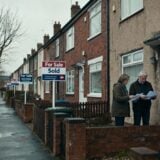But uncertainties about rising inflation means that interest rates could rise sooner than expected, according to the January House Price Index from Nationwide.
The three month on three month rate of change, usually a smoother indicator of the near term trend, dipped slightly from 2.3% in December to 2.1% in January, but this primarily reflects the smaller price increases recorded in November and December, said Nationwide chief economist Martin Gahbauer.
Unless there is a fall in property values in February, annual house price inflation is likely to move into double digit territory next month for the first time since May 2007, he revealed.
Over the course of the last month, there were several important pieces of economic news with relevance for the housing market; the news that the UK economy finally emerged from recession in the fourth quarter of 2009 and improved unemployment figures.
‘Although there may still be some upward revisions to the initial estimates of economic growth, this won’t change the fact that the rebound in the housing market and particularly house prices has gone some way beyond the recovery in the overall economy. This is a reversal of the picture in 2007/2008, when the housing market deteriorated much more quickly and at an earlier point in time than the wider economy,’ said Gahbauer.
Even although unemployment fell in November for the first time since February 2008 and December saw a second consecutive decline in the number of jobless benefit claimants, these hide some of the other adjustments that have been taking place in the labour market, most notably with regard to average pay, said Gahbauer.
As average earnings growth has fallen to the lowest levels on record, as many employers have opted to spread their cost reduction measures over a wider segment of the workforce by freezing or reducing pay, this ‘aggressive cut’ in pay inflation has both an upside and downside implication for house prices.
‘With pay inflation near zero or even negative, every additional increase in house prices worsens housing affordability, particularly since interest rates are very unlikely to fall any further. This limits the upside potential for the current recovery in house prices. On the other hand, pay restraint has allowed more people to stay in work and continue to service their mortgages at the current low rates of interest. As a result, relatively few households have been under financial pressure to sell their homes into what remains a relatively weak demand environment,’ Gahbauer explained.
He added that the future path of interest rates is ‘critical for the housing market’, particularly with a growing proportion of the mortgage stock now on variable rate deals. Although many experts believe that interest rates will remain unchanged until the final quarter of the inflation trends in 2009 are starting to call into question the validity of this view.
‘Some survey evidence suggests that spare capacity is less than in the previous recession which may mean that downward pressure on inflation may not actually be as strong as predicted. If this is the case, then higher interest rates may be required sooner than is widely assumed,’ added Gahbauer.
UK property prices make strong start to 2010 but concerns about interest rate rises emerge
- Share this
- Share on Facebook
- Share on Twitter
- Share on LinkeIn
Register for Free
Keep up to date with latest news within the residential and commercial real estate sectors.
Already have an account? Log in





